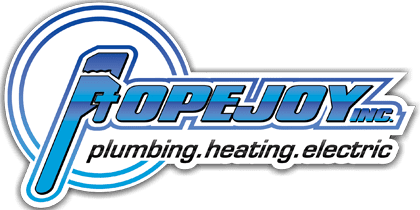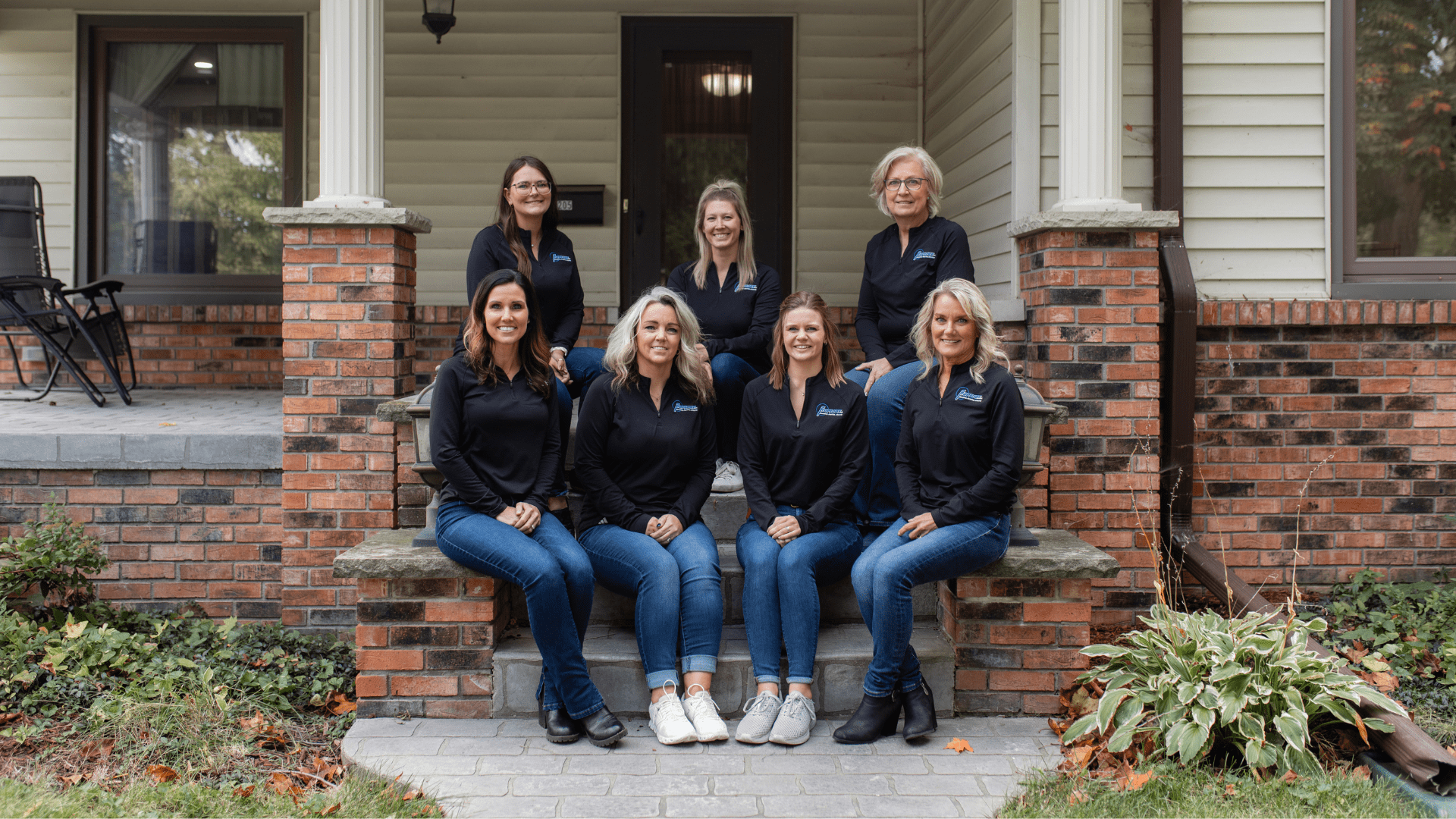FAQ
Here are some of our most frequently asked questions about HVAC (heating and cooling), plumbing, electric, water treatment, drain service, and more.
If you live in Pontiac, Morris, Streator, Braidwood, Coal City, Dwight, Fairbury, El Paso, Gibson City, Lexington, Chenoa, and Gilman, IL or the surrounding area, call the professionals at Popejoy Plumbing, Heating, Electric and Geothermal for answers to all of your questions about HVAC, electrical, plumbing and excavation services.
AC (Alternating Current) and DC (Direct Current) are two types of electrical currents. AC changes direction periodically while DC flows in only one direction. Most homes use AC current.
You may need a new electrical panel if you experience frequent circuit breaker trips, outdated wiring or if the panel is damaged.
Signs of an electrical problem in your home include flickering lights, blown fuses, a burning smell, or tingling sensations when touching electrical appliances.
The process of rewiring a home involves removing the old wiring and replacing it with new wiring. It also involves upgrading the electrical panel and adding new outlets and switches.
It is not recommended to install an electrical outlet yourself as electrical work requires specialized knowledge and training for safety reasons. It is best to hire a professional electrician.
A circuit breaker automatically turns off the electrical current when it senses a dangerous situation, such as a short circuit or an overload. A fuse is a device that contains a wire that melts when too much current flows through it, breaking the circuit.
The average cost of adding new electrical circuits in your home ranges from $300 to $800 per circuit.
Outdoor lighting installation can be complicated and should be performed by a professional electrician for safety reasons.
You may need to upgrade your electrical service if you experience frequent brownouts, have too few outlets, or have outdated wiring.
A GFCI (Ground Fault Circuit Interrupter) outlet is designed to protect you from electrical shock by interrupting the electrical circuit when it senses an imbalance between the current leaving and returning to the outlet.
Copper pipes are durable and heat resistant, PVC pipes are lightweight and cost-effective, and PEX pipes are flexible and resistant to corrosion.
A water heater should be replaced every 8 to 12 years, or when it shows signs of leakage or a decrease in efficiency. Water quality can dramatically influence the lifespan of a water heater.
At times, a leaky faucet can be fixed by replacing the O-ring or washer inside the handle, or by tightening the connection to the sink. Other times, the faucet will need replaced.
Signs of a clogged sewer line include slow drains, gurgling sounds in the pipes, and backups in the toilets or showers.
To unclog a drain, you can try using a plunger or a drain snake. Chemical drain cleaners should be used with caution as they can damage pipes. HOTROD FLO is an enzymatic drain cleaner to keep odors away after the clog is cleared.
The process of repiping a home involves removing the old pipes and replacing them with new pipes. It may be necessary if the pipes are corroded, leaking, or outdated.
Installing a new toilet can be challenging and requires plumbing knowledge and experience. It is recommended to hire a professional plumber.
The average cost of installing a new bathroom ranges from $7,000 to $20,000, depending on the complexity and materials used.
You should have your septic tank serviced every 3 to 5 years, or when you notice any changes in its performance, such as slow drains or backups.
The benefits of tankless water heaters include a continuous supply of hot water, energy efficiency, and a longer lifespan compared to traditional storage tank water heaters.
A furnace uses air to distribute heat, while a boiler uses water to distribute heat.
The air filter in your HVAC system should be replaced every 1 to 3 months, or as needed.
The process of installing a new HVAC system involves selecting the right size and type of equipment, preparing the installation site, connecting the ductwork and electrical systems, and testing the system.
Signs that you need a new HVAC system include increased energy bills, inconsistent or inadequate heating and cooling, frequent breakdowns, and an age of over 15 years for your current system.
A zoned HVAC system allows you to control the temperature in different areas of your home independently, leading to improved comfort and energy efficiency.
Installing a new HVAC system is complex and requires technical knowledge and experience. It is recommended to hire a professional HVAC technician.
The average cost of a new HVAC system ranges from $4,000 to $12,000, depending on the size, type, and complexity of the system.
You should have your air ducts cleaned if you notice excessive dust and debris, or if it has been over 5 years since your last cleaning.
A heat pump provides both heating and cooling functions, while an air conditioner only provides cooling.
A thermostat works by measuring the temperature in your home and controlling the operation of your HVAC system to maintain the desired temperature.
A water softener reduces the hardness of water by removing mineral ions, while a reverse osmosis system removes a wide range of contaminants through a filtration process.
The lifespan of a water treatment system varies depending on the type of system and the quality of the water being treated, but most systems should be replaced every 5 to 15 years.
A water treatment system can improve the taste, odor, and appearance of your water, as well as reduce the levels of contaminants, such as lead, chlorine, and bacteria.
Signs of contaminated water include strange tastes, odors, and appearances, as well as health issues such as skin irritation, digestive problems, and increased risk of disease.
The process of installing a water treatment system involves selecting the right type of system for your needs, sizing the system for your home, preparing the installation site, connecting the system to your plumbing, and testing the system.
Installing a water treatment system is complex and requires technical knowledge and experience. It is recommended to hire a professional water treatment specialist.
The average cost of a municipal water treatment system ranges from $3,000 to $6,000, depending on the type, size, and complexity of the system. The average cost of a well water treatment system ranges from $8,000 to $12,000.
Chlorine is a common chemical used in water treatment to kill bacteria and other microorganisms, while hydrogen peroxide is a more natural alternative that also provides a similar level of protection.
A water treatment system works by using various processes, such as filtration, ion exchange, and reverse osmosis, to remove contaminants and improve the quality of your water.
Some common types of contaminants found in water include bacteria, viruses, heavy metals, minerals, chemicals, and even radon. The presence of these contaminants can affect the taste, odor, and safety of the water, making it important to treat it with a suitable water treatment system.
The process of unclogging a drain typically involves using a plunger, a drain snake, or chemical cleaners to break up or remove the blockage. In more severe cases, professional drain cleaning services such as hydro jetting may be required.
The signs of a clogged sewer line include slow draining sinks and toilets, gurgling sounds from the pipes, and backed up water in the tub or shower.
It is recommended to have your drains cleaned once a year or as needed to prevent clogs and maintain proper drainage.
The average cost of drain cleaning can vary depending on the type of service, the severity of the clog, and the location of the property. On average, basic drain cleaning services can range from $100 to $400.
You can prevent clogs in your drains by being mindful of what you dispose of in the sink or toilet, using strainers in your sinks, and scheduling regular drain cleaning services.
Hydro jetting is a professional drain cleaning service that uses high-pressure water to clear out stubborn clogs and buildup in the pipes.
In some cases, you can unclog your own drain using a plunger or a drain snake. However, in more severe cases, it is best to call a professional for proper drain cleaning services.
Drain cleaning refers to the process of unclogging and cleaning the individual drains in your home, such as sinks, toilets, and showers. Sewer cleaning refers to the cleaning of the main sewer line that connects your home to the city sewer system.
The benefits of regular drain maintenance include improved drainage, reduced risk of clogs and backups, and longer lifespan of your plumbing system.
You may need professional drain services if you are experiencing slow draining sinks and toilets, gurgling sounds from the pipes, or backed up water in the tub or shower.
PLUMBING (Commercial & Residential): New Construction, Kitchen & Bathroom Remodels + Other Home Projects, Service Plumbing (Repairs), Water Heaters (Repair & Replace), Camera & Sewer Work, Full Water Treatment Systems, RPZ Back Flow Preventers, Etc.
HVAC (Commercial & Residential): New Construction, Installation & Repairs of Furnaces, Air Conditioners, Heat Pumps, Boiler Systems, Radiant In-Floor Heat, Geothermals, Roof Top Units, Custom Duct Work, Air Quality, Commercial Coolers & Freezers, Etc.
ELECTRICAL (Commercial & Residential): New Construction, Service Work (Repairs), Panel Work, House Rewires, Automatic Home Standby Generator Systems & Repairs, Etc.
EXCAVATING (Commercial & Residential): Trenching, Water Well Pumps, Underground Installs and Repairs, Sewer & Septic Install & Repairs
Just about everything inside and outside the home, we can handle. To inquire, call our office. We’ll gather an understanding of your issue and how we can assist.
Yes, we are fully licensed and insured in the state of Illinois. License: IL #055-014047
24/7 availability for on-call emergencies for current customers. Office Hours are 8am-5pm Monday through Friday.
Visit popejoyinc.com/request-an-appointment to fill out a form on our website. Or call our office to speak with a friendly receptionist at (815) 692-4471
Yes, for existing customers in Tier 1 and Tier 2 only. We do not take on after-hours appointments for new accounts. We always answer when you call, regardless of the time.
You can call in a card payment, mail a check, or stop by our office (in person) to pay. We accept all major credit cards and do our best to make the process simple for you.
Yes, standard warranty would be 90 days after work is completed, but many new installations of equipment far exceed that… sometimes giving the customer a 1 year, 2 year, 6 year, or 10 year warranty. Some are parts only and others are parts and labor, depending on the manufacturer’s warranty. We will make you aware based on the product or service you’re getting.
We always remain flexible with cancellations, as we are understanding that things come up. Regardless of the situation, simply call our office and we will do our best to accommodate whatever request you have. We will make every effort to meet your needs.
Yes, every department has specialists available to provide free estimates for new install work. If you’re interested, simply let us know and we’ll setup an appointment for a free estimate.
CLICK HERE to get a direct link for Google Review. We also appreciate reviews on our Facebook page. Thank you for taking the time to give us your feedback!

